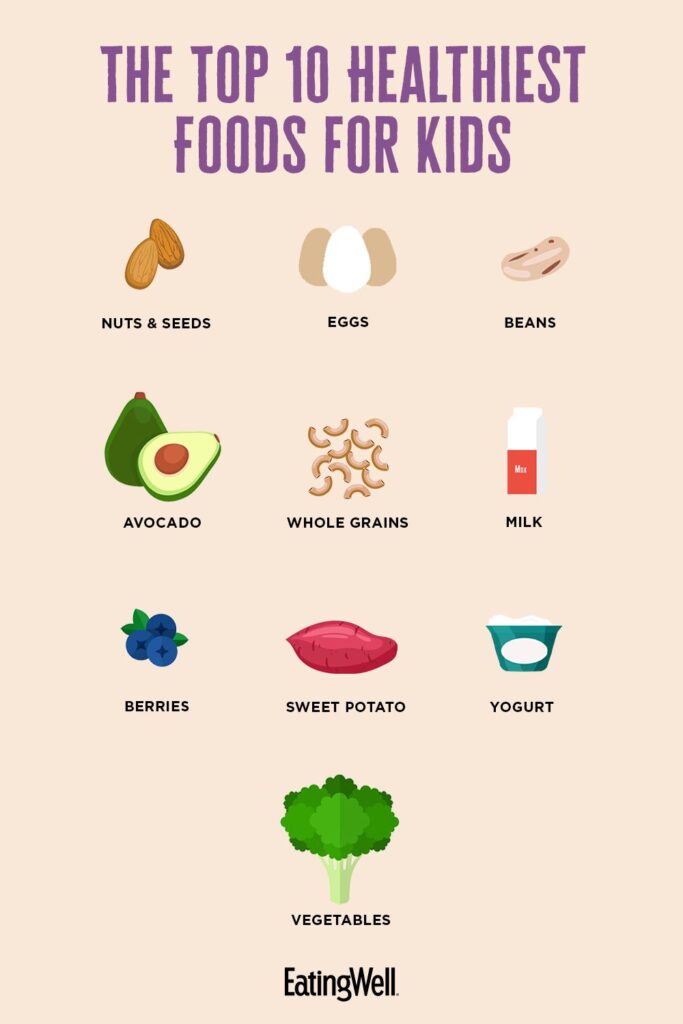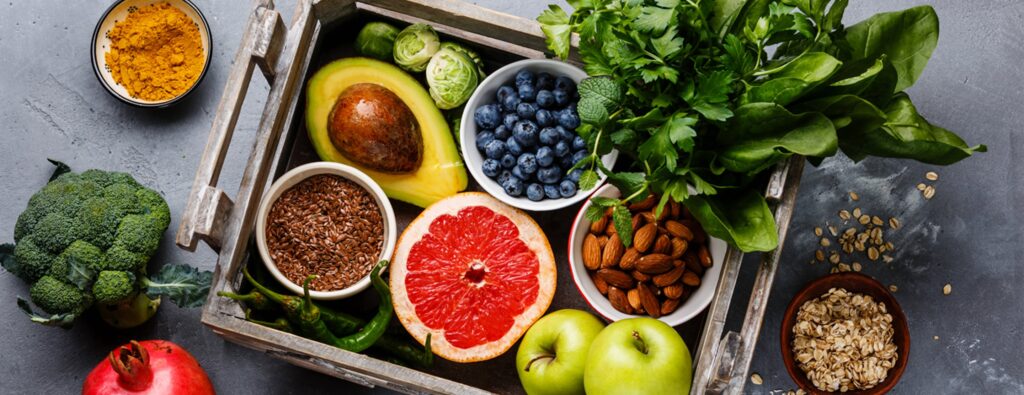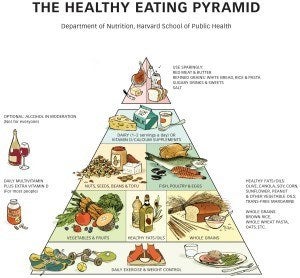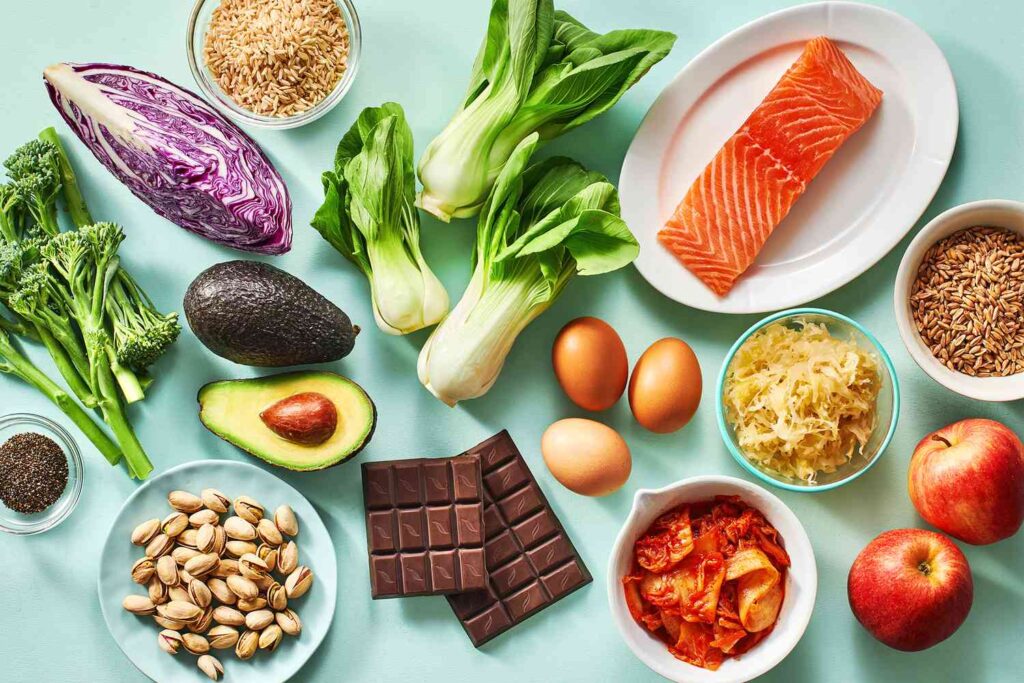When it comes to maintaining a balanced and healthy diet, the right choice of foods can make all the difference. From vibrant fruits packed with essential vitamins to nutrient-dense greens that fuel our bodies, we have the power to nourish ourselves from the inside out. In this article, I will guide you through the top 10 foods that should be on everyone’s radar for a well-rounded, nutritious diet. So, grab a pen and paper, and let’s embark on a culinary journey towards a healthier you!

1. Fruits
a. Berries
Berries are one of my favorite fruits to incorporate into my diet. Not only are they deliciously sweet, but they are also packed with nutrients and antioxidants. Berries such as strawberries, blueberries, raspberries, and blackberries are all excellent choices. These little powerhouses are not only low in calories but also high in fiber, which helps to promote healthy digestion. Berries are also known for their high levels of vitamin C, which can help support a healthy immune system.
b. Citrus fruits
Citrus fruits, such as oranges, lemons, limes, and grapefruits, are not only refreshing but also provide a wealth of health benefits. They are loaded with vitamin C, which is essential for collagen production, immune function, and wound healing. Citrus fruits are also a great source of dietary fiber and provide a natural sweetness to any dish or snack. Whether you enjoy them as a standalone snack, squeeze them into your water for a burst of flavor, or use them in your favorite recipes, citrus fruits are a fantastic addition to a healthy diet.
c. Apples
As the saying goes, “An apple a day keeps the doctor away.” Apples are not only delicious but also incredibly nutritious. They are a great source of dietary fiber, which can help regulate digestion and promote feelings of fullness. Apples also contain antioxidants, such as quercetin, which has been linked to a reduced risk of heart disease and certain types of cancer. With their crispy texture and naturally sweet flavor, apples make for a satisfying and healthy snack.
d. Bananas
Bananas are a versatile fruit that can be enjoyed in many different ways. They are an excellent source of potassium, which plays a vital role in maintaining proper heart and muscle function. Bananas are also rich in vitamin B6, which is essential for brain development and function. Their natural sweetness makes them a great addition to smoothies, oatmeal, or simply enjoyed on their own as a quick and easy snack.
e. Avocados
Avocados have gained popularity in recent years, and for a good reason. These creamy fruits are not only incredibly delicious but also packed with healthy fats. Avocados are an excellent source of monounsaturated fats, which can help lower bad cholesterol levels and reduce the risk of heart disease. They are also loaded with fiber, which aids in digestion and promotes feelings of fullness. Avocados can be enjoyed in many different ways, from spreading them on toast to adding them to salads or even using them as a healthy substitute for butter in baked goods.
2. Vegetables
a. Leafy greens
Leafy greens, such as spinach, kale, and Swiss chard, are an absolute powerhouse when it comes to nutritional value. These vegetables are low in calories but high in vitamins A, C, and K, as well as minerals like calcium and iron. Leafy greens also contain antioxidants and fiber, which can help reduce the risk of chronic diseases and promote healthy digestion. Whether enjoyed in a salad, sautéed, or added to smoothies, leafy greens are a must-have for a well-rounded and healthy diet.
b. Cruciferous vegetables
Cruciferous vegetables, including broccoli, cauliflower, Brussels sprouts, and cabbage, are not only delicious but also incredibly nutritious. These vegetables are known for their cancer-fighting properties and are rich in fiber and vitamin C. They also provide important phytochemicals that can help support overall health and wellness. Incorporating cruciferous vegetables into your diet can be as simple as steaming or roasting them as a side dish or adding them to stir-fries and salads.
c. Carrots
Carrots are a root vegetable that is not only crunchy and flavorful but also packed with nutrients. They are an excellent source of beta-carotene, which is converted to vitamin A in the body and is essential for healthy vision and immune function. Carrots are also high in fiber, which can help promote healthy digestion. Whether enjoyed raw as a snack or cooked in a variety of dishes, carrots are a versatile and healthy addition to any meal.
d. Bell peppers
Bell peppers come in a variety of colors, including green, red, yellow, and orange, and each offers its own unique set of health benefits. These vibrant vegetables are an excellent source of vitamins A and C, as well as antioxidants. Bell peppers are also low in calories and high in fiber, making them an ideal choice for weight management and overall health. They can be enjoyed in salads, stir-fries, or even stuffed with a delicious filling for a nutritious meal.
e. Tomatoes
Tomatoes are not only incredibly versatile but also incredibly healthy. They are an excellent source of lycopene, an antioxidant that has been linked to a reduced risk of certain types of cancer. Tomatoes are also rich in vitamins A and C, as well as potassium. Whether enjoyed fresh in a salad, cooked in sauces and soups, or roasted for added flavor, tomatoes are a delicious and nutritious addition to any meal.

3. Whole Grains
a. Oats
Oats are a nutritious whole grain that is not only versatile but also incredibly satisfying. They are an excellent source of dietary fiber, which can help promote healthy digestion and keep you feeling full for longer. Oats also provide important vitamins and minerals, such as iron and magnesium. Whether enjoyed as a warm and comforting bowl of oatmeal or used in baking recipes, oats are a great way to start the day or a wholesome snack option.
b. Quinoa
Quinoa has gained popularity in recent years as a superfood, and for good reason. It is a complete protein, meaning it provides all nine essential amino acids that our bodies cannot produce on their own. Quinoa is also gluten-free and packed with fiber, making it a great option for those with dietary restrictions or preferences. It can be used as a base for salads, added to soups and stews, or used as a substitute for rice or pasta.
c. Brown rice
Brown rice is a whole grain that is packed with important nutrients and fiber. Unlike white rice, which has had the bran and germ removed, brown rice retains these valuable components. It is an excellent source of vitamins and minerals, such as magnesium and selenium. Brown rice is also high in fiber, which can help regulate digestion and promote feelings of fullness. Its nutty flavor and chewy texture make it a great addition to stir-fries, salads, or as a side dish to accompany protein.
d. Barley
Barley is an often overlooked whole grain that deserves more attention. It is rich in fiber, particularly beta-glucan, which has been shown to have cholesterol-lowering effects. Barley is also a good source of important vitamins and minerals, such as iron and magnesium. Whether enjoyed in soups, stews, or added to salads, barley adds a deliciously nutty flavor and chewy texture to any dish.
e. Whole wheat
Whole wheat is a staple in many diets and for good reason. It is an excellent source of dietary fiber, which can help promote healthy digestion and regulate blood sugar levels. Whole wheat is also rich in vitamins and minerals, such as folate and iron. Whether enjoyed as whole wheat bread, pasta, or flour in baking recipes, this whole grain is a great way to incorporate wholesome carbohydrates into your diet.
4. Lean Proteins
a. Chicken breast
Chicken breast is a lean source of protein that is versatile and easy to incorporate into a healthy diet. It is low in fat and high in protein, making it an excellent option for those looking to build and maintain muscle. Chicken breast is also a good source of vitamins and minerals, such as niacin and selenium. It can be enjoyed baked, grilled, or sautéed, and is a great addition to salads, stir-fries, and sandwiches.
b. Turkey
Turkey is another lean protein option that is not only delicious but also provides a wealth of health benefits. Similar to chicken breast, turkey is low in fat and high in protein. It is also a good source of vitamins and minerals, including iron and zinc. Turkey can be enjoyed as a lean alternative to other meats, such as ground beef, and can be used in a variety of dishes, from burgers to meatballs.
c. Salmon
Salmon is a fatty fish that is not only incredibly delicious but also packed with nutrients. It is an excellent source of omega-3 fatty acids, which are important for heart health and brain function. Salmon is also a good source of high-quality protein and provides important vitamins and minerals, such as vitamin D and selenium. Whether enjoyed grilled, baked, or added to salads or sushi, salmon is a fantastic addition to a balanced and healthy diet.
d. Tofu
Tofu is a popular plant-based protein source that is commonly used in vegetarian and vegan diets. It is made from soybeans and is an excellent source of high-quality protein. Tofu is also a good source of important minerals, such as calcium and iron. The beauty of tofu is its versatility and ability to absorb flavors. It can be enjoyed in stir-fries, soups, or even as a substitute for meat in many dishes.
e. Lentils
Lentils are a type of legume that is not only incredibly nutritious but also budget-friendly. They are a great source of plant-based protein, dietary fiber, and important minerals such as iron and folate. Lentils have a mild flavor and can be incorporated into a variety of dishes, from soups and stews to salads and curries. Their versatility and nutritional profile make them an excellent choice for those looking to include more plant-based proteins in their diet.

5. Dairy Products
a. Milk
Milk is a staple in many households and is a great source of essential nutrients. It is rich in calcium, which is important for healthy bones and teeth. Milk is also a good source of high-quality protein and provides important vitamins, such as vitamin D and vitamin B12. Whether enjoyed on its own, added to smoothies or cereal, or used in cooking and baking, milk is a versatile ingredient that adds creaminess and nutrition to many dishes.
b. Yogurt
Yogurt is a fermented dairy product that offers a variety of health benefits. It is a great source of probiotics, which are beneficial bacteria that support a healthy gut microbiome. Yogurt is also a good source of protein, calcium, and important vitamins and minerals, such as vitamin B12 and magnesium. Whether enjoyed on its own, added to smoothies or parfaits, or used as a base for dressings and sauces, yogurt is a nutritious and delicious addition to any diet.
c. Cheese
Cheese is loved by many for its rich and creamy taste, and it can also be a part of a healthy diet when enjoyed in moderation. It is a good source of protein and calcium, which are essential for overall health. However, cheese can also be high in saturated fat and sodium, so it is important to choose lower-fat options and enjoy it in moderation. Adding a sprinkle of cheese to salads, pasta dishes, or sandwiches can provide a burst of flavor and a dose of nutrition.
d. Cottage cheese
Cottage cheese is a fresh cheese that is lower in fat and calories compared to other types of cheese. It is a good source of protein and calcium, making it a nutritious choice for those looking to support muscle growth and maintain bone health. Cottage cheese can be enjoyed on its own as a snack or added to salads, smoothies, or even baked goods for added creaminess and protein.
e. Greek yogurt
Greek yogurt is a strained yogurt that is thicker and creamier than regular yogurt. It is known for its high protein content and rich texture. Greek yogurt is also a good source of calcium and beneficial probiotics. Whether enjoyed on its own, used as a base for dips and sauces, or added to smoothies and baked goods, Greek yogurt offers a nutritious and satisfying addition to a balanced diet.
6. Nuts and Seeds
a. Almonds
Almonds are a versatile and delicious nut that is packed with nutrients. They are an excellent source of healthy fats, fiber, and protein, making them a great option for those looking for a plant-based source of nutrition. Almonds are also rich in antioxidants, vitamin E, and minerals such as magnesium and potassium. Whether enjoyed on their own as a snack, added to salads, or used as a topping for oatmeal and yogurt, almonds provide a satisfying crunch and a wealth of health benefits.
b. Walnuts
Walnuts are another nut that offers a variety of health benefits. They are rich in omega-3 fatty acids, which are important for heart health and brain function. Walnuts are also a great source of antioxidants, fiber, and protein. They can be enjoyed on their own, added to baked goods, or used as a topping for salads for a delicious and nutritious crunch.
c. Chia seeds
Chia seeds have gained popularity in recent years as a superfood. These tiny seeds are packed with nutrients and provide a wealth of health benefits. They are an excellent source of fiber, which can help promote healthy digestion and regulate blood sugar levels. Chia seeds are also high in omega-3 fatty acids, protein, and antioxidants. They can be used to make delicious chia pudding, added to smoothies, or used as an egg substitute in baking recipes.
d. Flaxseeds
Flaxseeds are another seed that is rich in nutrients and offers many health benefits. They are an excellent source of omega-3 fatty acids, fiber, and antioxidants. Flaxseeds can help promote healthy digestion, reduce inflammation, and support heart health. To enjoy the full benefits of flaxseeds, it is recommended to grind them before consumption. They can be incorporated into smoothies, sprinkled on top of yogurt or oatmeal, or used in baking recipes for a nutritious and flavorful addition.
e. Pumpkin seeds
Pumpkin seeds, also known as pepitas, are a delicious and nutritious snack. They are an excellent source of protein, healthy fats, and important minerals such as magnesium, manganese, and zinc. Pumpkin seeds can be enjoyed on their own as a snack, added to trail mixes, or used as a topping for salads and roasted vegetables. They offer a satisfying crunch and a wide array of health benefits.

7. Legumes
a. Chickpeas
Chickpeas, also known as garbanzo beans, are a versatile legume that provides a variety of health benefits. They are an excellent source of plant-based protein and dietary fiber, which can help regulate digestion and support overall health. Chickpeas are also rich in important vitamins and minerals, such as folate and iron. Whether enjoyed in hummus, added to salads, or used as a base for vegetarian dishes, chickpeas offer a delicious and nutritious addition to any meal.
b. Kidney beans
Kidney beans are a type of legume that is not only delicious but also packed with nutrients. They are an excellent source of dietary fiber and provide important vitamins and minerals, such as iron and folate. Kidney beans are also a great source of plant-based protein, making them a valuable option for vegetarian and vegan diets. Whether used in chili, soups, or salads, kidney beans provide a hearty and nutritious addition to a balanced diet.
c. Black beans
Black beans are another legume that offers a variety of health benefits. They are an excellent source of plant-based protein, fiber, and important minerals such as iron and magnesium. Black beans can help support healthy digestion, regulate blood sugar levels, and promote feelings of fullness. They can be enjoyed in a variety of dishes, from tacos and burritos to salads and soups, adding flavor, texture, and nutrition.
d. Lentils
Lentils, mentioned earlier as a lean protein source, are part of the legume family and deserve a mention of their own. They are an excellent source of plant-based protein, fiber, and important minerals such as iron and folate. Lentils are incredibly versatile and can be used in a wide variety of dishes, from soups and stews to salads and curries. Their mild flavor and ability to absorb flavors make them a valuable ingredient in any kitchen.
e. Peanuts
Peanuts, although technically a legume, are often referred to as nuts due to their similar characteristics. They are a great source of plant-based protein, healthy fats, and important minerals such as magnesium and phosphorus. Peanuts are also rich in antioxidants and provide heart-healthy monounsaturated fats. Whether enjoyed as a snack on their own, added to trail mixes, or used to make peanut butter, peanuts offer a delicious and nutritious way to incorporate legumes into your diet.
8. Healthy Fats
a. Olive oil
Olive oil is a staple in Mediterranean diets and is known for its health benefits. It is a rich source of heart-healthy monounsaturated fats, which can help reduce bad cholesterol levels and lower the risk of heart disease. Olive oil is also a good source of antioxidants and provides important vitamins, such as vitamin E. Whether used in salad dressings, as a cooking oil, or drizzled over roasted vegetables, olive oil adds a delicious flavor and a dose of healthy fats to any dish.
b. Avocado oil
Avocado oil is another healthy fat option that offers a variety of health benefits. It is high in monounsaturated fats, which can help improve heart health and reduce inflammation. Avocado oil is also rich in antioxidants and provides important vitamins such as vitamin E. It has a mild flavor and a high smoke point, making it a great option for cooking, baking, or adding to dressings and marinades.
c. Coconut oil
Coconut oil has gained popularity in recent years as a versatile and healthy fat option. It is high in saturated fat, but it primarily consists of medium-chain triglycerides (MCTs), which are metabolized differently than long-chain fatty acids. Coconut oil can be used for cooking, baking, or adding a tropical flavor to various dishes. However, it is important to use coconut oil in moderation due to its high saturated fat content.
d. Nut butter
Nut butter, such as peanut butter, almond butter, or cashew butter, is a delicious and nutritious way to incorporate healthy fats into your diet. It is a great source of monounsaturated and polyunsaturated fats, as well as protein and important vitamins and minerals. Nut butter can be enjoyed on bread, added to smoothies or oatmeal, or used as a dip for fruits and vegetables. Just be sure to choose varieties that are free from added sugars and unhealthy additives.
e. Fatty fish
Fatty fish, such as salmon, mackerel, sardines, and trout, are not only incredibly delicious but also packed with omega-3 fatty acids. These types of fish are rich in heart-healthy fats that can lower bad cholesterol levels, reduce inflammation, and support brain health. Fatty fish are also a good source of high-quality protein and provide vitamins and minerals such as vitamin D and selenium. Whether grilled, baked, or pan-seared, incorporating fatty fish into your diet can provide a wide array of health benefits.

9. Herbs and Spices
a. Turmeric
Turmeric is a vibrant yellow spice that is commonly used in traditional Indian cuisine. It contains a compound called curcumin, which has powerful anti-inflammatory and antioxidant properties. Turmeric has been used for centuries in traditional medicine to treat a variety of ailments. It can be incorporated into curries, stir-fries, or golden milk for its unique flavor and health benefits.
b. Cinnamon
Cinnamon is a warm and aromatic spice that is not only delicious but also offers a variety of health benefits. It has been shown to help regulate blood sugar levels, reduce inflammation, and lower cholesterol levels. Cinnamon can be sprinkled onto oatmeal, added to smoothies, or used in baking recipes for a delicious and nutritious flavor.
c. Ginger
Ginger is a root that is commonly used in traditional medicine to treat various ailments. It has powerful anti-inflammatory and antioxidant properties and can help alleviate nausea and aid in digestion. Ginger can be enjoyed in tea, used as a spice in cooking and baking, or added to smoothies for a spicy and refreshing flavor.
d. Garlic
Garlic is not only a flavorful addition to many dishes but also offers a wide range of health benefits. It contains compounds that have been shown to have antibacterial, antiviral, and antifungal properties. Garlic can also help support heart health, regulate blood pressure, and boost the immune system. Whether used in savory dishes, roasted, or added to sauces and dressings, garlic adds depth and flavor to a wide array of recipes.
e. Oregano
Oregano is an herb that is commonly used in Mediterranean and Italian cuisines. It is rich in antioxidants, which can help reduce inflammation and protect against chronic diseases. Oregano also has antimicrobial properties and can help fight against harmful bacteria. Whether used fresh or dried, oregano adds a delicious flavor to pasta sauces, roasted vegetables, and marinades.
10. Water
a. Importance of hydration
Water is essential for maintaining overall health and well-being. It plays a vital role in digestion, nutrient absorption, temperature regulation, and the elimination of waste products from the body. Staying properly hydrated is crucial for optimal physical and cognitive function, as well as for maintaining healthy skin, hair, and nails.
b. Benefits of drinking water
Drinking an adequate amount of water has numerous benefits for our bodies. It helps to increase energy levels, improve brain function and focus, promote healthy digestion, and support healthy weight management. Water also helps to flush toxins out of the body, support healthy kidney function, and maintain proper hydration of our cells, tissues, and organs.
c. How much water to drink per day
The amount of water a person needs to drink per day can vary depending on factors such as age, sex, activity level, and overall health. However, a general guideline is to aim for at least 8 glasses or about 2 liters (64 ounces) of water per day. It is important to listen to your body’s thirst cues and drink water throughout the day to stay properly hydrated.
d. Ways to stay hydrated
In addition to drinking plain water, there are various ways to stay hydrated throughout the day. Eating water-rich foods such as fruits and vegetables can contribute to your daily water intake. Herbal teas, infused water, and coconut water can also provide hydration while adding flavor. It is important to limit or avoid sugary drinks and excessive caffeine, as they can lead to dehydration.
In conclusion, incorporating a variety of fruits, vegetables, whole grains, lean proteins, dairy products, nuts and seeds, legumes, healthy fats, herbs and spices, and staying properly hydrated are key components of a balanced and healthy diet. By including these foods in your daily meals and snacks, you can ensure that you are getting a wide range of essential nutrients and promoting overall health and well-being. Remember to listen to your body’s needs, make mindful choices, and enjoy the process of nourishing yourself with these nutritious options.


